Related Research Articles

The Sanhedrin was an assembly of either 23 or 71 elders, appointed to sit as a tribunal in every city in the ancient Land of Israel.

The Kingdom of Hanover was established in October 1814 by the Congress of Vienna, with the restoration of George III to his Hanoverian territories after the Napoleonic era. It succeeded the former Electorate of Hanover, and joined 38 other sovereign states in the German Confederation in June 1815. The kingdom was ruled by the House of Hanover, a cadet branch of the House of Welf, in personal union with Great Britain since 1714. Since its monarch resided in London, a viceroy, usually a younger member of the British royal family, handled the administration of the Kingdom of Hanover.

The first laws to emancipate Jews in France were enacted during the French Revolution, establishing them as citizens equal to other Frenchmen. In countries that Napoleon Bonaparte's ensuing Consulate and French Empire conquered during the Napoleonic Wars, he emancipated the Jews and introduced other ideas of freedom from the French Revolution. For instance, he overrode old laws restricting Jews to reside in ghettos, as well as lifting laws that limited Jews' rights to property, worship, and certain occupations.

Israel Jacobson was a German-Jewish philanthropist and communal organiser. Jacobson pioneered political, educational and religious reforms in the early days of Jewish emancipation, and while he lacked a systematic religious approach, he is also considered one of the heralds of Reform Judaism.
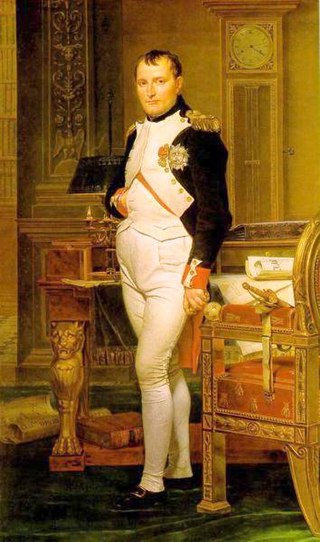
On March 17, 1808, Napoleon made three decrees in a failed attempt to promote the equality of Jews and integrate them into French society, building on the Jewish Emancipation of 1790–1791. The Infamous Decree, the third of the three decrees, had adverse effects. Although its aim was to grant equal citizenship, it restricted Jewish money lending, annulled all debts owed to Jews by married women, minors and soldiers, voided any loan that had interest rates exceeding 10 percent, and limited the residency of new Jewish peoples in France by restricting their business activities, while allowing work in agriculture and craftsmanship. The combination of these decrees severely weakened the financial position of once dominant rural French money lending Jews.

The Kingdom of Westphalia was a client state of France in present-day Germany that existed from 1807 to 1813. While formally independent, it was ruled by Napoleon's brother Jérôme Bonaparte. It was named after Westphalia, but this was a misnomer since the kingdom had little territory in common with that area. The region mostly covered territory formerly known as Eastphalia.
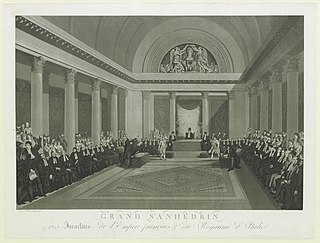
The Grand Sanhedrin was a Jewish high court convened in Europe by Napoleon to give legal sanction to the principles expressed by an assembly of Jewish notables in answer to the twelve questions submitted to it by the government. The name was chosen to imply that the Grand Sanhedrin had the authority of the original Sanhedrin that had been the main legislative and judicial body of the Jewish people in classical antiquity and late antiquity.
The Israelite Central Consistory of France is an institution set up by Napoleon I by the Imperial Decree of 17 March 1808 to administer Jewish worship and congregations in France. He also directed the establishment of regional Israelite Consistories, subordinate to the Central Consistory, across France. The consistories were ranked as établissements publics du culte. Given Napoleon's political emancipation of the Jews, he wanted a representative body that could deal with his government.
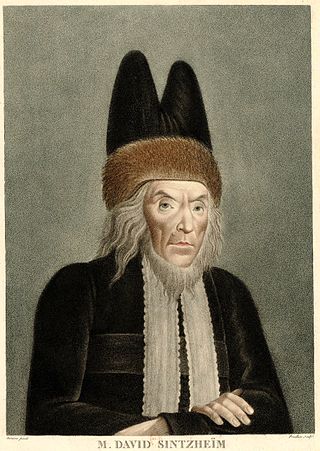
Joseph David Sinzheim was the chief rabbi of Strasbourg. He was son of Rabbi Isaac Sinzheim of Treves, and brother-in-law of Herz Cerfbeer.

The history of the Jews in Livorno, Italy has been documented since 1583, when descendants of the late 15th-century expulsions from Spain and Portugal settled in the city. They were settled initially by Sephardic Jews from Pisa. The Jewish community of Livorno, although the youngest among the historic Jewish communities of Italy, was for some time the foremost: its members achieved political rights and wealth, and contributed to scholarship in the thriving port city. Numerous Jewish schools and welfare institutions were established.

The history of the Jews in Alsace is one of the oldest in Europe. It was first attested to in 1165 by Benjamin of Tudela, who wrote about a "large number of learned men" in "Astransbourg"; and it is assumed that it dates back to around the year 1000. Although Jewish life in Alsace was often disrupted by outbreaks of pogroms, at least during the Middle Ages, and reined in by harsh restrictions on business and movement, it has had a continuous existence ever since it was first recorded. At its peak, in 1870, the Jewish community of Alsace numbered 35,000 people.
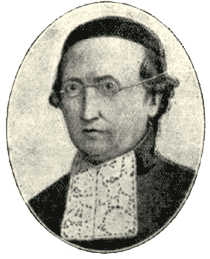
Salomon Ulmann, was a French rabbi.
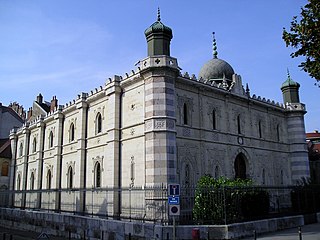
The beginnings of the history of the Jews in Besançon go back to the Middle Ages, a period during which the Jews settled in the city attracted by its activity as a commercial place. The community was founded at the end of the 14th century and, due to its status as a free imperial city, Besançon remained one of the only territories in present-day France to tolerate Jews after their expulsion from the kingdom of France in 1394. The community was nevertheless expelled in turn from Besançon in the middle of the 15th century. The Jews made a tentative return to the city in the 18th century, but it was only after the French Revolution, which emancipated them, that their situation in the Franche-Comté capital stabilized. Although the Jewish community never exceeded 2,000 people except on the eve of the Second World War, it experienced great economic success during the industrial revolution at the end of the 19th century, when the Lipmann family founded LIP, a brand of watchmaking which then became one of the economic engines of the region and remained associated with the name of the city.
Louis-Lazare Kahn, known as Admiral Louis Kahn, was the first French Jewish Admiral, and a leader of the French Jewish community.
The Protestant Reformed Church of Alsace and Lorraine is a Calvinist denomination in Alsace and northeastern Lorraine, France. As a church body, it enjoys the status as an établissement public du culte.
The Protestant Church of the Augsburg Confession of Alsace and Lorraine is a Lutheran church of public-law corporation status in France. The ambit of the EPCAAL comprises congregations in Alsace and the Lorrain Moselle department.

In Protestant usage, a consistory designates certain ruling bodies in various churches. The meaning and the scope of functions varies strongly, also along the separating lines of the Protestant denominations and church bodies.

Alfred Lévy was a French rabbi who became Chief Rabbi of France in the period immediately before and during World War I.

The General Union of French Israelites was a body created by the antisemitic French politician Xavier Vallat under the Vichy regime after the Fall of France in World War II. UGIF was created by decree on 29 November 1941 following a German request, for the express purpose of enabling the discovery and classification of Jews in France and isolating them both morally and materially from the rest of the French population. It operated in two zones: the northern zone, chaired by André Baur, and the southern zone, under the chairmanship of Raymond-Raoul Lambert.
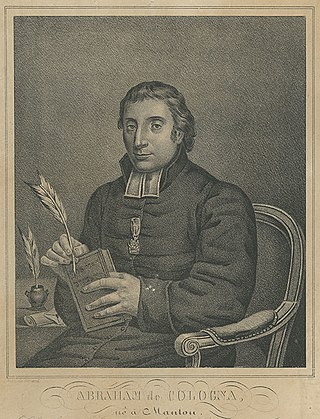
Abraham (Vita) de Cologna was an Italian-born orator, politician, and religious leader. He is considered to have been one of the first Chief Rabbis of France, following David Sintzheim and preceding Emmanuel Deutz.
References
 This article incorporates text from a publication now in the public domain : Gotthard Deutsch (1901–1906). "Consistory". In Singer, Isidore; et al. (eds.). The Jewish Encyclopedia . New York: Funk & Wagnalls.
This article incorporates text from a publication now in the public domain : Gotthard Deutsch (1901–1906). "Consistory". In Singer, Isidore; et al. (eds.). The Jewish Encyclopedia . New York: Funk & Wagnalls.- Felix Lazarus, Das Königlich Westphälische Konsistorium der Israeliten: nach meist unbenützten Quellen, Bratislava: Alkalay, 1914.